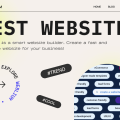
Go Ask Your Customers or Common Startup Problems Revealed at Google Launchpad
This week, Weblium got an honor to participate in Google Launchpad, a startup acceleration program aimed at connecting aspiring entrepreneurs with the experience of industry leaders from around the globe.
We asked the mentors what common startup problems they see and if there are any ways to overcome those. Here’s what we learned.
Contents
Day 1. Product Development
Google Launchpad started with product sessions. The speakers and mentors helped us understand what lies at the heart of a successful product company and how to establish long-lasting customer relationships.
“The most typical mistake that startups make is to build a product without asking the customers. Just f***ing ask your customers what they need”
Benno Loewenberg, Product Designer and Consultant
Benno focused on product strategy for startups. In his keynote, he explained why so many products fail, highlighting that any decision making shouldn’t be based on internal feeling or personal experience but on exploring customers’ needs.
“Try to build a customer-company interaction model within customer journey, and then list as many possible f***ups as you can. Then, think of how to prevent them.”
Bartosz Balewski, UX Consultant
Bartosz made a crash test of our customer journey, which helped us to understand what risks we face at every stage. As a result, we came up with a set of measures to minimize the flaws.
Day 2. UX/UI Design
On Day 2 we had an intense session and review of our product interface solution. The experts described the most common problems that many aspiring startups face. Here are the most critical ones:
“Many products have two problems: they solve the wrong issue and add too many features impossible to be validated”
Alexander Vilinskyy, Product Designer at Readdle
“The most typical problem is that startups often begin with the product, not a problem.”
Austin Keeble, UX/UI Consultant
Day 3. Marketing
Our third day was filled with insights on how to bring a product to the market. SPOILER: marketing can’t solve the problems of a bad product, so you should deal with it first.
“Start with a detailed persona and keep it in mind during building all the funnel. Be more human in messaging.”
Yonatan Kagansky, Founder of NewSpark and Marketer
Yonatan pointed out that people face an overload of information, while their attention span is getting shorter. As a result, they aren’t patient and have much higher expectations for a product.
Thus, startups need to determine a clear persona and build the entire story around it. Only this can help you turn a prospect into a paying customer.
“The most common mistakes of startups at the beginning are their failure to define the right target audience and unique value proposition, as well as having no definite business plan or key team players. But the most epic one is creating a startup for the sake of a startup.”
Viktor Lokotkov, Deputy CEO at 404 Digital Agency
Viktor explained how a startup should set up their marketing efforts from defining the target audience to releasing an MVP. He stressed that it’s not worth creating a product simply because “you can.” Any idea should be based on an insight of what issues people have. Only then, a company should move on to design a solution.
Day 4-5. Business and Growth
The last two days were dedicated to the overarching objective of sustaining the growth of the company. Here are some of the highlights we gathered:
“The most typical mistake is that companies forget about the initial purpose of their business in a routine.”
Roman Cherepakha, Investment Director at Horizon Capital
Although pivoting is a common practice, where a startup modifies its strategy during ongoing learning, a company’s initial vision should remain unchanged. Otherwise, a company loses something that tells it apart from its competitors.
“The most common startup problem is that they don’t analyze their customers. Therefore, new businesses fail in channels, messages, and sales approaches.”
Jens Garberding, Strategic Partner Manager at Google
Working at Google in EMEA region, Jens noticed that many startups have something in common – they fail to understand their customers, the reason why their sales funnels are ineffective.
“The most useful question you can ask your customers is how they can describe your business to their neighbors.”
Daniel Johnson, Head of Growth at KOMPAS Travel


